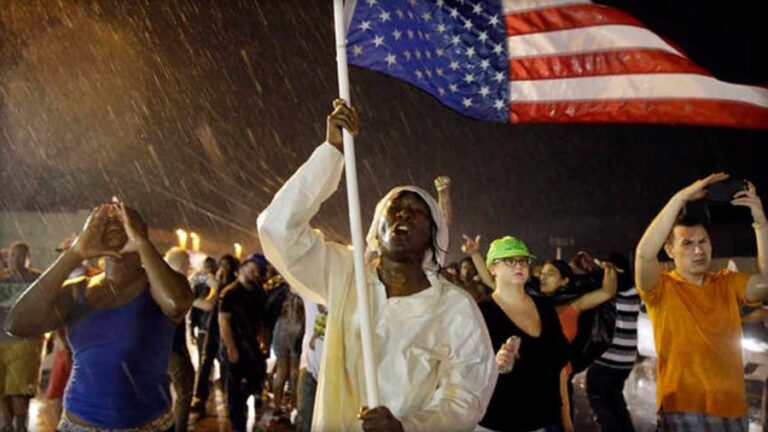Fighting the Religious Fight
A federal district court recently ruled that a Pennsylvania school district violated both the free speech and religious freedom rights of satanists when the district excluded the satanists from running an after-school Satan club in a public school. Also in the news recently: A restraining order was placed against a Christian street preacher named Rich Penkoski for posting biblical verses online in response to the same-sex “marriage” of a woman in Bartlesville, Oklahoma.
Apparently Penkoski has been preaching against various forms of the LGBT movement, from same-sex activity to drag queens in libraries, for some time. The judge ruled that, by posting pictures of the same-sex couple’s “wedding” along with Bible verses condemning their conduct, Penkoski was knowingly and willfully engaging in conduct that “a reasonable person would believe to be harassment and would therefore suffer substantial emotional distress.” Reportedly, the judge also claimed that Penkoski “does not have a constitutional right to repeatedly single out the couple.”
The facts in both cases matter, of course, but there is a broader cultural takeaway here. In the same week, a Trump-appointed federal judge ruled that satanists have a right to free speech and free exercise of religion among our school children, while a judge in Oklahomaopined that a Christian preacher does not have the right to post Bible verses critical of homosexuality aimed at a same-sex couple.
On both right and left, a sense of America as a religious nation has been lost. The left considers it a constitutional offense any time a government allows any shred of Christianity—a coach praying after a football game, funding of private schools that includes Christian schools—to exist in the public square. Many on the right offer no real response, murmuring that we have to defend free speech and religious liberty, no matter what is being said or practiced, in the name of liberty.
I have previously written about the traditional limits on religion and speech at the time the Constitution was ratified. Modern ears may be shocked or offended, but our legal, cultural, and political history simply was not obsessed with unlimited freedom for any person or group to say or do whatever it wanted in the public square. Our American heritage favored monotheistic (mostly Christian) religion. Many states had a long history of criminal laws that prosecuted blasphemy. Public prayers were said in presidential inaugural addresses and public worship was held in federal government buildings. This is not theocracy, whatever critics might say. This is the heritage of Americans, free Americans.
The left will continue its march toward instituting secularism as state religion. Public worship has been replaced with land acknowledgements. Opening prayers are out, stating one’s pronouns is in. Christian creeds cannot be tolerated, but the dogmas of anti-racism must be embraced in the public square. I haven’t yet heard of anyone swearing his oath of office on a copy of How to Be an Anti-Racist, but we may get there.
The right ought to wake up and abandon its silly, weak neutrality on religion, but it probably won’t. We know that critical race theory, “wokeness,” and the transgender agenda are bad for our voters, our families, and our children. So we fight against them. The widespread practice of Christianity is good for individuals, families, and society as a whole. A leveling theory stating that all belief systems, no matter their content, are equally valid and protected under law, is bad for individuals, families, and society as a whole. Banning Christianity from the public square is a terrible blow to the common good. Why are we so ignorant or timid that we do not embrace these politics of religion the way we embrace the anti-woke agenda? We have the historical and legal tools to fight for religious and moral sanity. Why do we not fight?
The pessimist, or perhaps simply the realist, would respond that it is hard to fight seriously for that which we don’t truly believe or live. The state of Christianity in America, as readers here probably know, isn’t great. In 2020, 64 percent of Americans still identified as Christians, but at the pace people are shedding Christian identity and identifying as atheist, agnostic, or generally religiously unaffiliated, it is quite possible that in the next 50 years Christians will no longer be a majority of the population and the atheists/agnostics/“nones” could approach majority status.
For American Christianity, there is not just a quantity problem, but a dire quality problem. Pew performed a revealing Religious Landscape Study several years ago that highlights the major issue: Self-identifying Christians do not seriously practice their faith. The study found fewer than 40 percent of Catholics and one-third of mainline Protestants even attend church services weekly. The numbers are lower among younger people. Even among regular attendees, the percentage of Christians who pray regularly, have a sense of wonder at the universe, take their notions of right and wrong from religion, or derive their views of morality and politics from their religion are quite low.
While there are fewer and fewer Christians, and the ones who remain practice their faith less and less seriously, there have also been major cultural shifts accelerating the problem. As Aaron Renn highlights in his concept of the “three worlds of Evangelicalism,” society viewed being a Christian as generally a positive thing until around the 1990s, where it became more neutral. In the last decade or so, mainstream society has perceived being a Christian as negative. As the culture became less positive about Christianity, Christians began shifting from the culture war mentality of the Reagan years to what Renn calls a “cultural engagement strategy.” Rather than fight the secular culture, many Christian leaders—especially those who occupy the upper echelons of society—shifted to a “gentler” approach, where Christianity seeks to be a voice among many in the public square, focusing more on the non-confrontational aspects of the Gospel: love, social justice, and the like.
As Renn points out, that strategy will not work. As society views orthodox Christian faith with greater hostility, Christians will not simply be left to gently proclaim the Gospel while occupying their places among elite institutions. The disengagement from the culture war has ceded too much ground to the secular left, and created a Christian populace – especially among leadership – unwilling to confront the destruction.
Thus, the source of the legal and political crisis. Renn may be right that the major reason Christians are unwilling to fight the godless, anti-religious agenda is the leadership of the “cultural engagement” Christians who consciously avoid these fights. Or it really could be a simple numbers problem: among conservatives, there are many who do not practice faith much or at all, and among those who do, many do not let that faith shape the way they view the world outside of church. When we lack a sufficient number of serious Christians, and many of those who are left are intentionally avoiding the political fights, it is no wonder that we lack an enthusiastic base to fight godlessness the way we are ready to fight wokeness.
“Our Constitution,” John Adams cautioned, “was made only for a moral and religious People. It is wholly inadequate to the government of any other.” We now live in a nation where courts uphold the constitutional right of satanists to have public clubs for school children, while prosecuting street preachers for posting Bible verses online. It is hard to look at the state of things and think John Adams or any of the Founders would see anything other than a failed experiment in republican self-government. Whatever it once was, this is not a nation run by moral and religious people. If American decline can be stopped, this moral and religious issue is at the heart of it all.
This is not a mere abstract analysis of negative cultural trends. These are real things taking place in our own neighborhoods and towns. They involve schools and libraries supported by our tax dollars. And they directly involve our own kids. This is where Rod Dreher’s Benedict Option becomes less an option and more a necessary reality. It is not a question of whether to adopt some form of the Benedict Option, but to realize that we already live in a culture that leaves us no other choice.
This does not mean we ought to disengage, but it does mean we must opt out of quite a bit. We should fight for school boards, but we should not send our kids to schools where satanists and drag queens have a place in forming our children. We should address religious leaders about doctrinal weakness or heresy, but we should not attend woke churches and services that endanger the well-being of our families’ souls. We should continue pushing the conservative political movement to embrace bold religious positions, but we should not put too much stock in politics to come to the aid of religion in decline.
The answer to the question, “Do we engage in the political and cultural battles of the day, or do we opt out and form alternate communities?” must be “both.” We cannot cede the culture to the destructive forces at work. We must do battle at every political level, from local school districts to state capitols to Washington, D.C. But in the meantime, we need to keep our kids—and our own souls—out of the destructive culture of woke schools, woke churches, and the toxic smartphones in our pockets. We need to build communities that will form sane people who will one day, please God, continue the work of restoring a healthy, thriving Christian culture. If we have become a weak minority incapable of stopping the bad legal rulings and policy decisions plaguing us, we can keep fighting nonetheless, and sow the seeds for a future generation to rise up and win the fight.







